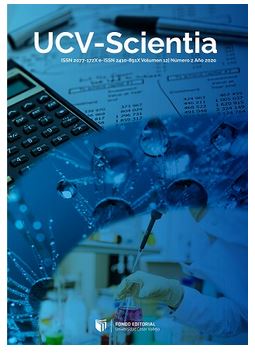Implementation of Remote Emergency Education. The case of the Intercultural School of the National Intercultural University of the Central Jungle Juan Santos Atahualpa in pandemic
DOI:
https://doi.org/10.18050/RevUcv-Scientia.v14n1a5Keywords:
University; Remote Emergency Education; Online Learning; PandemicAbstract
The Covid-19 health emergency at the international level led to the interruption of face-to-face classes, since then the intercultural public university has faced various challenges in mediating the continuation of the educational service in the application of ‘Emergency Remote Education’ (ERE) . In this sense, the article highlights the bibliographic review around the state of the matter, the implementation of the ERE from the higher university regulations in a pandemic, the characteristics of the phenomenon, its phases, as well as the implications in the Professional School of Bilingual Intercultural Education. of the Juan Santos Atahualpa National Intercultural University of the Central Jungle (UNISCJSA) during the semesters 2020-1 and 2020-2. The method used is qualitative case study immersion and documentary analysis. Among the main conclusions we can affirm that the ERE that was given in the UNISCJSA was in the modality of Remote Urgent Not Adapted and that this type of teaching was due to the absence of institutional resources not provided to teachers and the meager expertise in technological management.
of the teaching staff which were exhibited in the development of their classes.
References
Resolución del Consejo Directivo N° 039-2020- SUNEDU-CD. “Criterios para la supervisión de la adaptación de la educación no presencial, con carácter excepcional, de las asignaturas por parte de universidades y escuelas de posgrado como consecuencia de las medidas para prevenir y controlar el COVID-19”. 27 de marzo de 2020. https://www.gob.pe/institucion/sunedu/normas-legales/614718-039-2020
Resolución del Consejo Directivo N° 039-2020- SUNEDU-CD. “Criterios para la supervisión de la adaptación de la educación no presencial, con carácter excepcional, de las asignaturas por parte de universidades y escuelas de posgrado como consecuencia de las medidas para prevenir y controlar el COVID-19”. 27 de marzo de 2020. https://www.gob.pe/institucion/sunedu/normas-legales/614718-039-2020
Bozkurt, A., & Sharma, R., (2020). Emergency remote teaching in a time of global crisis due to CoronaVirus pandemic. Asian Journal of Distance Education. Volume 15, Issue 1, 2020. 1347-9008 (ISSN) https://doi.org/10.5281/zenodo.3778083
Bustamante, R., (2020). Educación en cuarentena: cuando la emergencia se vuelve permanente. Aportes para el Diálogo y la Acción. Proyecto CREER – GRADE. JUNIO 2020 N° 4 http://www.grade.org.pe/creer/archivos/articulo-4.pdf
Castañeda, L., Tur, G., y Torres-Kompen, R. (2019). Impacto del concepto PLE en la literatura sobre educación: la última década. RIED. Revista Iberoamericana de Educación a Distancia, 22(1), pp. 221-241. doi: http://dx.doi.org/10.5944/ ried.22.1.22079
El Said, G. R. (2021). How Did the COVID-19 Pandemic Affect Higher Education Learning Experience? An Empirical Investigation of Learners’ Academic Performance at a University in a Developing Country. Advances in Human-Computer Interaction. Article ID 6649524. https://doi.org/10.1155/2021/6649524
Hodges, C., Moore, S., Lockee, T., & Bond, A. (2020). The difference between emergency remote teaching and online learning. shorturl.at/iTVY4
Instituto Nacional de Estadística e Informática (2021). Estado de la población peruana 2020. shorturl.at/atXZ9
Moorhouse, B. L. & Wong, K. (2021). Blending asynchronous and synchronous digital technologies and instructional approaches to facilitate remote learning. J. Comput. Educ. (2021). https://doi.org/10.1007/s40692-021-00195-8
Pardo, H., y Cobo C. (2020). Expandir la universidad más allá de la enseñanza remota de emergencia. Ideas hacia un modelo híbrido post-pandemia. Outliers School. Barcelona. https://outliersschool.net/wp-content/uploads/2020/05/Expandir_la_universidad.pdf
Porkhrel, S., & Chhetri, R. (2021). A Literature Review on Impact of COVID-19 Pandemic on Teaching and Learning. Higher Education for the Future 8(1) 133–141, 2021 https://doi.org/10.1177/2347631120983481
Portillo, S., Castellanos, L., Reynoso, O., y Gavotto, O. (2020). Enseñanza remota de emergencia ante la pandemia Covid-19 en Educación Media Superior y Educación Superior. Propósitos y Representaciones, 8 (SPE3), e589. Doi: http://dx.doi.org/10.20511/pyr2020.v8nSPE3.589
Plataforma digital única del Estado Peruano (2021). Programas y Organizaciones Sociales. shorturl.at/efltU
Secretaría Nacional de la Juventud (2021). Informe Nacional de Juventudes 2020 Ser joven en el primer año de la pandemia. Resumen-Informe-Nacional-de-Juventudes-2020.pdf
UNESCO (2020). Aportes para una respuesta educativa frente al COVID-19 en América Latina: análisis desde la evidencia del Laboratorio Latinoamericano de Evaluación de la Calidad de la Educación (LLECE). shorturl.at/bcop8
UNESCO (2020b). COVID-19 y educación superior: De los efectos inmediatos al día después. Análisis de impactos, respuestas políticas y recomendaciones. https://www.iesalc.unesco.org/wp-content/uploads/2020/05/COVID-19-ES-130520.pdf
Vera, F. (2021). Experiencias de docentes durante la pandemia. Revista Electrónica Transformar, ISSN 2735-6302 en colaboración con Red Internacional de Investigadores en Educación (REDIIE) https://revistatransformar.cl/index.php/transformar/issue/view/13/13
Vera, F. (2021b).). Experiencia de docentes universitarios durante la educación remota de emergencia debido a la crisis por COVID-19. Revista Electrónica Transformar, 2(2), 45-57. ISSN 2735-6302. https://revistatransformar.cl/index.php/transformar/article/view/22
Yela, L., Reyes, D., Olguín, A. y Pulido, X. (2021). Desafíos educativos que enfrentan los estudiantes universitarios durante la pandemia COVID-19. En Revista Paraguaya de Educación a Distancia, FACEN-UNA, Vol. 2 (1), 41–52. Recuperado a partir de https://revistascientificas.una.py/index.php/REPED/article/view/2241
Downloads
Published
How to Cite
Issue
Section
License

This work is licensed under a Creative Commons Attribution-NonCommercial 4.0 International License.
- Share — copy and redistribute the material in any medium or format
- Adapt — remix, transform, and build upon the material.
- The licensor cannot revoke these freedoms as long as you follow the license terms.
Under the following terms:
-
Attribution — You must give appropriate credit, provide a link to the license, and indicate if changes were made. You may do so in any reasonable manner, but not in any way that suggests the licensor endorses you or your use.
- No additional restrictions — You may not apply legal terms or technological measures that legally restrict others from doing anything the license permits.













